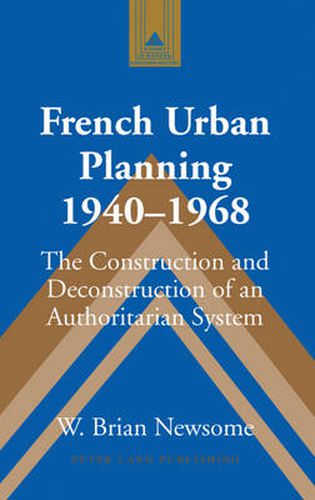Readings Newsletter
Become a Readings Member to make your shopping experience even easier.
Sign in or sign up for free!
You’re not far away from qualifying for FREE standard shipping within Australia
You’ve qualified for FREE standard shipping within Australia
The cart is loading…






This title is printed to order. This book may have been self-published. If so, we cannot guarantee the quality of the content. In the main most books will have gone through the editing process however some may not. We therefore suggest that you be aware of this before ordering this book. If in doubt check either the author or publisher’s details as we are unable to accept any returns unless they are faulty. Please contact us if you have any questions.
French Urban Planning 1940-1968 explores the creation and progressive dismantling of France’s centralized, authoritarian system of urban and architectural planning. Established in the wake of World War II to facilitate the reconstruction and expansion of cities, this planning program led to the evolution of large suburban housing estates plagued by inter/intra family conflict, juvenile delinquency, and other social difficulties, which sociologists connected to poor planning and design. Critics began calling for the democratization of planning to remedy design problems, and the government of Charles de Gaulle started reforming planning procedures in the late 1950s and early 1960s. This book moves beyond technical and political issues to explore forces of religion, gender, and class that affected planning practices. Key critics and state officials emerged from the Catholic Left. Some were women from working-class backgrounds, and they manipulated gender stereotypes to insert working- and middle-class women into the design process. Sometimes in opposition, but often together, these reformers initiated the most significant change of architectural and urban planning until the introduction of Francois Mitterrand’s decentralization reforms in the 1980s. French Urban Planning 1940-1968 will appeal to scholars and students interested in architectural, urban, and social trends in twentieth-century France.
$9.00 standard shipping within Australia
FREE standard shipping within Australia for orders over $100.00
Express & International shipping calculated at checkout
This title is printed to order. This book may have been self-published. If so, we cannot guarantee the quality of the content. In the main most books will have gone through the editing process however some may not. We therefore suggest that you be aware of this before ordering this book. If in doubt check either the author or publisher’s details as we are unable to accept any returns unless they are faulty. Please contact us if you have any questions.
French Urban Planning 1940-1968 explores the creation and progressive dismantling of France’s centralized, authoritarian system of urban and architectural planning. Established in the wake of World War II to facilitate the reconstruction and expansion of cities, this planning program led to the evolution of large suburban housing estates plagued by inter/intra family conflict, juvenile delinquency, and other social difficulties, which sociologists connected to poor planning and design. Critics began calling for the democratization of planning to remedy design problems, and the government of Charles de Gaulle started reforming planning procedures in the late 1950s and early 1960s. This book moves beyond technical and political issues to explore forces of religion, gender, and class that affected planning practices. Key critics and state officials emerged from the Catholic Left. Some were women from working-class backgrounds, and they manipulated gender stereotypes to insert working- and middle-class women into the design process. Sometimes in opposition, but often together, these reformers initiated the most significant change of architectural and urban planning until the introduction of Francois Mitterrand’s decentralization reforms in the 1980s. French Urban Planning 1940-1968 will appeal to scholars and students interested in architectural, urban, and social trends in twentieth-century France.